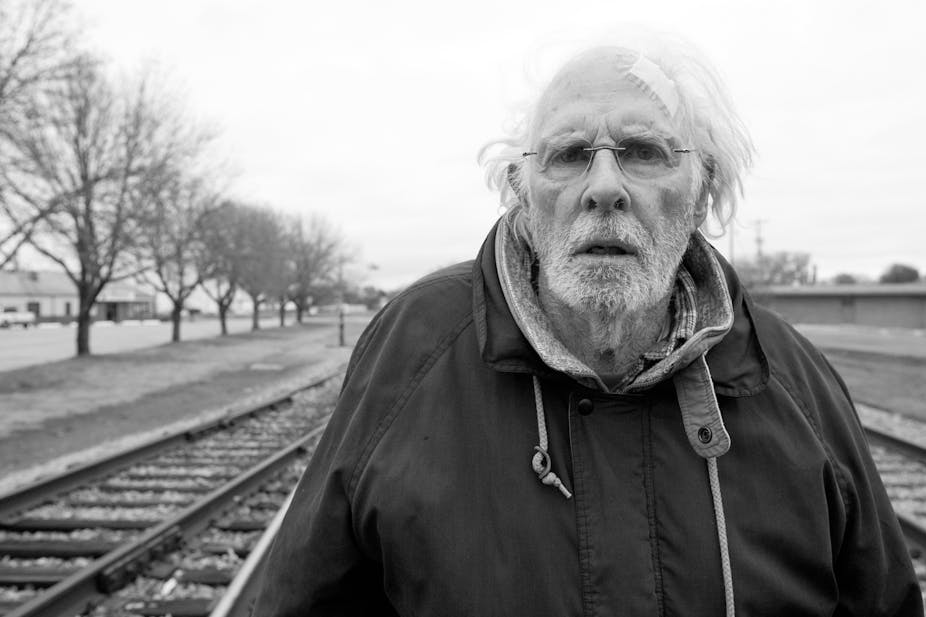Despite a respectable six nominations under its belt, you would be forgiven for believing that Nebraska is likely to be outshone by brighter stars come Oscars night. In all probability, Alexander Payne’s wry, bittersweet road movie has little hope in the category of Best Picture, positioned against the ground-breaking blockbuster Gravity, the harrowing drama 12 Years a Slave and the jazzy, entertaining American Hustle. But the bigger players shouldn’t dominate the scene too much – so let’s not write off this horse just yet.
Elaborating on director Payne’s recurring features of flawed characters and missed opportunities in his earlier films About Schmidt and Sideways, Nebraska has a more poignant and personal edge, playing out a simple story of an old man looking to claim a million dollar sweepstake prize. Here, the leisurely structure of the road movie informs the presentation of a broken, disaffected American Midwest, a reality far removed from the glamour of Hollywood.
Ever since his win at the Cannes Film Festival in May last year, Bruce Dern has been hailed as a strong Oscar contender in the Best Actor category. This is in large part due to his lengthy, but not especially distinguished career. Making his debut in 1960, Dern has gone on to feature in more than 80 films, including memorable roles in the The Great Gatsby, Black Sunday and Coming Home, for which he received an Academy Award nomination for Best Supporting Actor.
Playing the ornery, borderline senile Woody Grant, Dern’s performance isn’t as dramatic as others this year, most notably the powerhouse, transformative roles played by Matthew McConaughey and Chiwetel Ejiofor. But his subtle, unfussy portrayal cuts to the heart of his character’s pathos, his sense of losing control, feeling his dreams slipping away for good. Dern plays a character who walks a fine line between being unwittingly oblivious to those around him and seeming to feign dementia so as to be left alone, and he masters the subtleties of this extraordinarily.
Often distant and introspective, the occasional glint in his eye suggests there are deeper processes in operation beneath the surface – and at the mere mention of his prospective fortune, Woody’s mind becomes as sharp as a tack. But it is also a tremendously compassionate performance, one which communicates the difficulty of being at ease with oneself and with a life. Acquaintances and distant family members fall over themselves to take advantage of him, and Woody’s acquiescence to go along with them threatens to undermine his own plans.
On account of his distinctive demeanour, as well as his versatility, Dern has largely featured in a range of supporting character roles over his career. Nebraska serves as a reminder, not only of his talent, but also of his presence and potency. It is here expressed through an underlying fragility. Sometimes, as with Emmanuelle Riva of Amour last year, the nomination and the attention it carries with it may have to be recognition enough, a brief but affecting celebration and appreciation of a lifetime of work.
Mention should also be made of June Squibb’s firecracker performance as Woody’s long-suffering wife, Kate. Stealing many of the scenes, as Jennifer Lawrence does in American Hustle, Squibb has also been a refreshing, self-effacing presence on the awards circuit. One of the essential pleasures of her character is seeing her amusing inappropriateness and persistent badgering subtly give way to true concern and affection for her husband.
Despite the dominance of Gravity in this category, Nebraska’s cinematography provides a welcome alternative to this fantastic spectacle. Marking his third collaboration with Payne, Phedon Papamichael shot the film in handsome wide-screen monochrome, presenting an odd combination of old-fashioned black-and-white imagery shot in high-definition digital.
The photography holds a stark sobriety that supports the film’s genuine and sensitive collage of ordinary life, while the high definition adds a sharpness of texture and allows for exceptionally clear surface details, emphasising the range of shadow and light.
Far from draining meaning from the screen, the black-and-white imagery enhances the film’s wistful sensibilities. It expresses both the desolation of the landscape and the disappointment of its characters. Poised and compassionate, the film aesthetically complements the desire not to judge its protagonists, no matter how stubborn, opportunistic or underhanded they may be.
For instance, when Woody returns with his family to visit his childhood home, now dilapidated and brimming with unpleasant memories, there is both great beauty and a sense of history to be found in the details of the cracked walls, empty door-frames and upturned furniture. The monochrome only emphasises this. The scene seems to distill the film’s careful balance of comedy and pathos, cutting to the heart of struggling to relate to the past and to lost futures.
Given the intricate marriage of this imagery to Mark Orton’s lilting, folksy score, it is an added shame that the music could not be rewarded alongside it. But the charm and frankness of the film abides, and I hope that the memorable performances of Dern and Squibb, along with the film’s distinctive cinematography, ensure that Nebraska is not merely remembered as an also-ran in this particularly competitive year.

